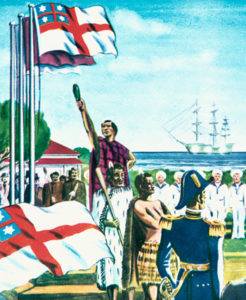
Reluctant Colonisers
New Zealand in the 1830s had no government or political structure either Polynesian or British. The native tribes were frequently at war with one another and there was no concept of a united Pacific nation. This was despite the fact that in 1835 there was a Declaration of Independence cobbled together by British Resident, James Busby. Although signed by a number of chiefs, mostly from Northland, and accepted by the British government, it did not set up a unified Maori nation.
Up until 1838. the British government had no desire to get involved in New Zealand and establish another expensive colony. It was well aware that British settlement was increasing, but was reluctant to interfere. In the meantime, it was happy to let the Governor of New South Wales monitor the changing New Zealand scene from across the Tasman. However, ultimately it was the expanding European (mainly British) economic activity, trading and settlement, and concerns over the impact of these developments on the native peoples that forced the British government’s hand. Also influencing London were the concerns expressed by missionaries and the entreaties of some chiefs.
The Maori Dark Age
The scattered native tribes (variously called indigenous people, Aborigines, savages, natives, New Zealanders, but not Maori at this stage), had been rapidly killing each other off since the 1800s in devastating inter-tribal conflicts, sometimes called the Musket Wars.
In over 500 battles prior to 1840, tens of thousands of indigenous people had been killed or wounded and many innocent men, women and children had been senselessly slaughtered and often eaten. Hundreds of others had been taken into slavery.
Furthermore unfamiliar diseases, like smallpox, were decimating the population in many areas, notably among Ngai Tahu in the South Island.
European influences on the native peoples increased as the 1830s proceeded, but the degree of interaction varied enormously. The tribal groups of the north, especially in Northland, had the greatest contact with white missionaries, traders, settlers, escaped convicts from Australia and travellers.
Inevitably there was inter-marriage, and this would ultimately mean that today all Maori are in fact part-Maori, and most have more ancestors of European origin than Polynesian…….
